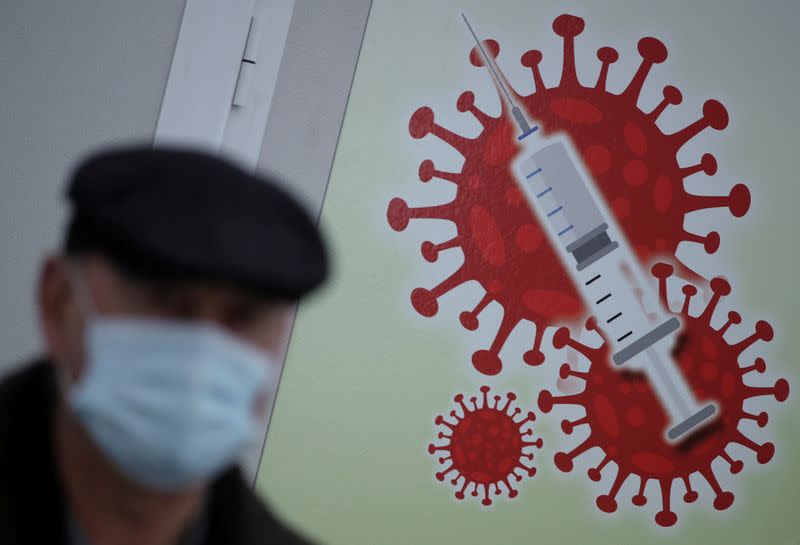What you need to know about the coronavirus right now

(Reuters) - Here's what you need to know about the coronavirus right now:
India widens curbs as infections top 20,000 for 6th day
India reported 24,492 new coronavirus cases on Tuesday, the sixth straight day of more than 20,000 infections, as curbs to try to stop the spread of COVID-19 were expanded in parts of the country that have recorded a surge.
The government has blamed crowding and a general reluctance to wear masks for the spike, ruling out mutations of the virus as a factor, unlike in the West.
India's worst-affected state, Maharashtra, on Monday ordered cinemas, hotels and restaurants to limit guests to half of capacity until the end of the month. Weddings and other social events will also have limited attendance. Another western state, Gujarat, has also decided to not allow fans into the world's biggest cricket stadium hosting international matches between India and England, after seeing a spurt in cases.
Throat swab test accuracy may vary by time of day
The accuracy of gold-standard PCR tests of nasopharyngeal swab samples may vary by time of day, new data suggests. Researchers analysed 31,094 tests performed in symptomatic and asymptomatic individuals at 127 testing sites, including 2,438 tests that showed COVID-19.
In a paper posted on Saturday on medRxiv ahead of peer review, they report tests were most likely to be positive around 2 p.m. - and the proportion of positive tests in the early afternoon was twice as high as the lowest proportion seen at other times of the day.
The study "suggests people may be more contagious at certain times of the day and it raises questions about whether tests for SARS-CoV-2 may be less accurate when they are collected between late evening and early morning," said co-author Dr. Candace McNaughton of Vanderbilt University. "If our findings are confirmed, clinicians and public health teams could focus their efforts on lowering the risk of viral spread during times of peak viral shedding," she said. That could entail emphasising midday to early-afternoon isolating at home, or encouraging early morning shopping for vulnerable populations.
Moderna begins testing next-generation coronavirus vaccine
Moderna Inc said on Monday it had dosed the first participant in an early-stage study of a new COVID-19 vaccine candidate that could potentially be stored and shipped in refrigerators instead of freezers.
The company said its new candidate could make it easier for distribution, especially in developing countries where supply chain issues could hamper vaccination drives.
The early-stage study will assess the safety and immunogenicity of the next-generation vaccine, designated as mRNA-1283, at three dose levels, and will be given to healthy adults either as a single dose or in two doses 28 days apart, the company said. Moderna also plans to evaluate the new vaccine as a potential booster shot in future studies.
Australia to continue using AstraZeneca COVID-19 vaccine
Australia has no plans to halt the use of the AstraZeneca COVID-19 vaccine, authorities said on Tuesday, even though several European countries paused administering the vaccine after reports of possible serious side-effects.
Australia Chief Medical Officer Paul Kelly said in an emailed statement the government remained confident in the vaccine as there was currently no evidence that it caused blood clots though the side-effects reported would be investigated as a "precautionary measure".
The top WHO scientist reiterated on Monday that there had been no documented deaths linked to COVID-19 vaccines. "We do not want people to panic," WHO chief scientist Soumya Swaminathan told the briefing, adding that no association had so far been found between the "thromboembolic events" reported in some countries and COVID-19 shots.
WHO urges healthworkers to allow lifesaving mother-baby contact
Two new studies cited by the World Health Organization (WHO) found that thousands of neonatal healthcare workers are not allowing mothers with confirmed or suspected COVID-19 infections to have skin-to-skin contact with their newborns, and nearly a quarter of those surveyed are not allowing breastfeeding.
Yet keeping mothers and babies together and encouraging all babies to have so-called "kangaroo mother care" – which involves early and very close contact between a mother and a newborn - could save more than 125,000 lives, according to a study published in the Lancet EclinicalMedicine journal.
The WHO says mothers should continue to share a room with their babies from birth and be able to breastfeed and have skin-to-skin contact – even when COVID-19 is suspected or confirmed.
(Compiled by Karishma Singh; Editing by Ana Nicolaci da Costa)


